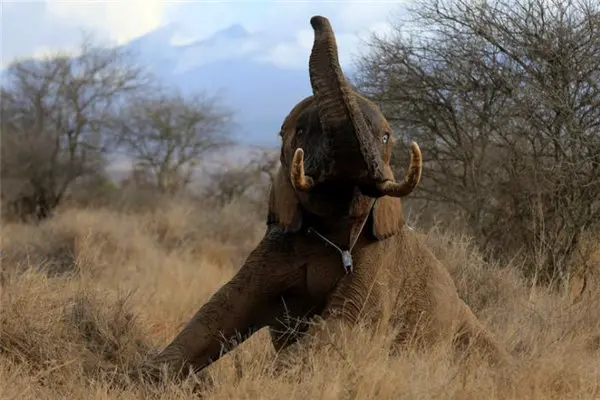Scientists in Kenya are fitting radio collars on elephants to help secure the "corridors" they use between national parks, part of a conservation drive that has seen the nation's elephant population double within the last 35 years.
"The purpose for collaring the elephants is that will provide information on its movements across this landscape," said Steve Jumbe, head of programs in East Africa for the conservation body International Fund for Animal Welfare.
"Those movements will define critical corridors and dispersal areas that the elephants use ... so that we can secure [these areas.]"
Conservationists used a combination of helicopters, four-wheel-drive vehicles and elders from the local Masaai tribe to track the elephants across the grass savannah.
A Kenya Wildlife Service (KWS) ranger stands guard as a male elephant is fitted with an advanced satellite radio tracking collar to monitor their movement and control human-wildlife conflict near Mt. Kilimanjaro at the Amboseli National Park, in Kenya November 2, 2016. Photo:REUTERS
Two more elephants were fitted with collars on Wednesday, making a total of 14 elephants being tracked under the program. Both were darted outside the limits of Amboseli National Park in southern Kenya, in areas where herders were grazing livestock, underscoring the potential for conflict with humans.
Elephants also often raid crops and farms as they migrate between parks, angering villagers who rely on their produce to feed their families.
But tracking data from the IFAW project showed elephants could be deterred by electric fences around farms, suggesting a way for the animals and their human neighbors to live together more peacefully.
The collars can also provide rangers with an early warning if the elephants are straying too close to human habitation.
The Kenya Wildlife Service said elephant numbers had rebounded to 32,000 from a low of 16,000 in 1989, the year that the world conservation body CITES banned sales of ivory from African elephants. Kenya's Wildlife Service was set up a year later.
But elephants remain threatened by poaching and habitat loss.
(REUTERS)
 简体中文
简体中文

